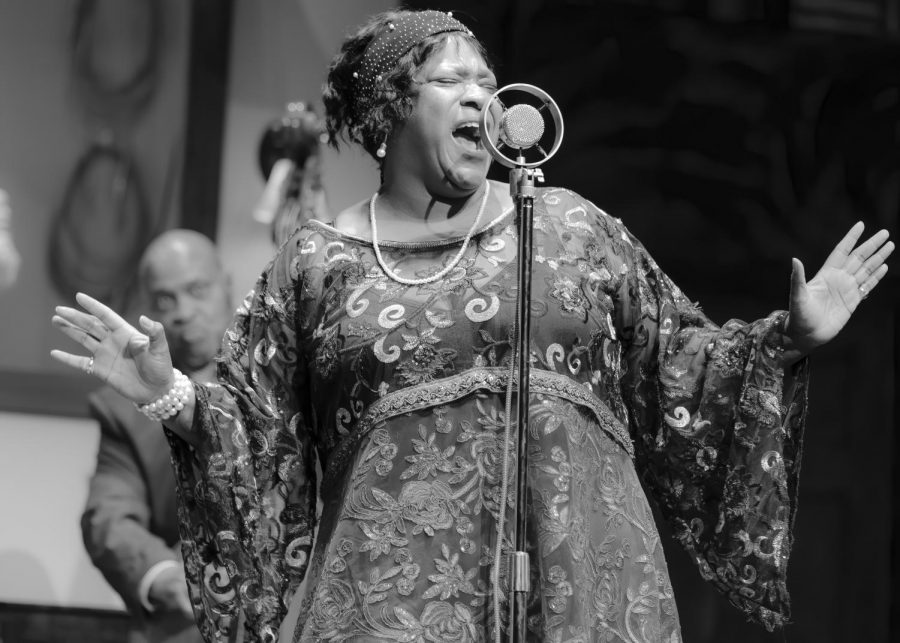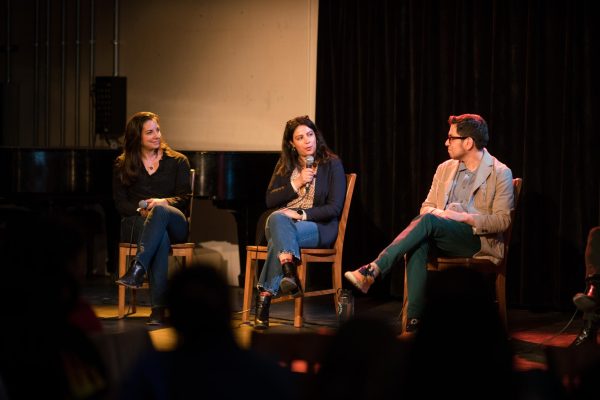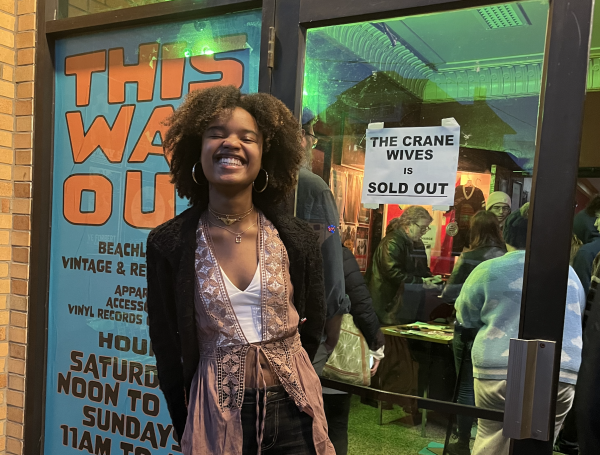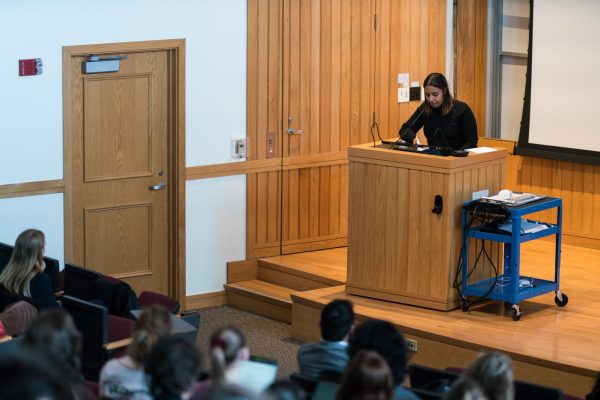Ma Rainey’s Black Bottom Opens at Cleveland’s Karamu House
Ma Rainey: Starring a combination of Oberlin students and Cleveland actors, Ma Rainey’s Black Bottom, directed by Oberlin Associate Professor of Theater and Africana Studies Justin Emeka, OC ’95, opened on Oct. 8 at Karamu House.
Cleveland’s Karamu House — the oldest Black theater in the country — kickstarted its 2021–22 season with August Wilson’s 1982 play Ma Rainey’s Black Bottom on Oct. 8. The production, which will run through Oct. 31, is directed by Oberlin alumnus and Associate Professor of Theater and Africana Studies Justin Emeka, OC ’95, and stars a nine-person cast of Cleveland actors and Oberlin students. After COVID-19 derailed the theater world, this play marks a prodigious return to in-person acting for director and actors alike — a moment of epic proportions compounded by the legacy of Karamu House and the relevance August Wilson’s work holds in our current day and age.
Set in a 1920s recording studio, Ma Rainey’s Black Bottom follows “Mother of Blues” Ma Rainey and her band players as they record her new album under rapidly mounting pressure. The characters’ richly emotional and introspective dialogue explores Black identity and blues culture within the social and political traumas of the Great Migration, imparting Black history, joy, and rage with a poignancy that transcends time. Oberlin students acting in the play include College fourth-year Cyril Amanfo as Sylvester, College fourth-year Ro Miller as Irvin, and Jaris Owens, OC ’20, as Levee.
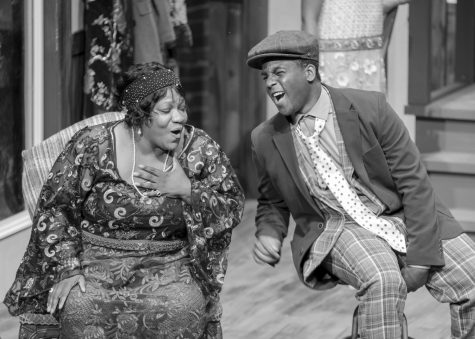
(Courtesy of Will Lindsey)
Emeka has been teaching at the College for 16 years, and Ma Rainey marks his fourth time directing at Karamu House. This play in particular reflects a multifaceted convergence of novelty and excitement in his seasoned work as both actor and director. It’s Emeka’s first time directing live since a play he was working on in Pittsburgh was forced to close on its opening night in March 2020, and it’s his first time directing the work of August Wilson, a longtime icon in Emeka’s professional and artistic career.
“August is one of the most important playwrights in American history, really, but definitely of the 20th century,” Emeka said. “He wrote a play for every decade of the 20th century and a play that explored the Black experience in each decade. As a young, aspiring theater artist, August Wilson was always one of my heroes and I always dreamed of directing an August Wilson play. …I’ve been directing for a little over 20 years and so this is the first time that I get to direct one of my favorite playwrights’ work. And so it was really exciting for me.”
The day before Ma Rainey’s opening night, Emeka found himself stepping even further into Wilson’s work. He lost one of his actors, who was set to play the role of philosophical pianist Toledo, and had only 36 hours to prepare to take on the part. Luckily, he came to the role with some very relevant experience under his belt, having acted in Oberlin’s 2008 production of Ma Rainey.
“Toledo is one of my favorite roles in all of August Wilson’s plays,” Emeka wrote in a message to the Review. “He has a Pan-African sensibility that I really identify with. I love how he sees the world and engages the other characters with his wisdom and sense of humor. … I first played the role of Toledo in a production that Professor [of Theater and Africana Studies] Caroline Jackson-Smith directed at Oberlin College when I was a visiting assistant professor in 2008. Though it was 13 years ago, that production really prepared me well to step into the role again and be comfortable because I knew I had a ‘Toledo’ living inside of me.”
This wasn’t the first time Emeka has taken on a role at the very last minute — once, he had to go on for an actor with only 45 minutes’ notice. To him, theater is all about the thrill and risk of make-believe; he finds that audiences tend to appreciate the ability to witness actors execute on-the-fly adaptability in light of unique challenges — at the very least, it makes for a good story. Flexibility aside, Emeka makes it a regular habit to cast his students in his productions, and was thrilled to work alongside his cast.
“It was a strange and wonderful experience to create a world as a director with a talented cast and then literally step inside with them as an actor and live in the moment of that world,” Emeka said. “I was able to experience so many new rhythms, intentions, angles, emotions, shapes, and relationships that I hadn’t seen before. Honestly, it was a lot of fun.”
Recent Oberlin graduate Owens, who plays the role of Levee, regards Emeka as a mentor and worked closely with him for the entirety of his Oberlin career, taking his classes and acting in many of his plays. Emeka brought Owens into his production of Ma Rainey after one of his Capoeira classes, and Owens took the opportunity to audition for his first professional role outside of Oberlin. Owens sought advice from Emeka on the audition process, but it was his first time flying solo in the theater world — he auditioned for the Karamu House, not Emeka himself. Now, fresh off the show’s opening weekend, Owens is thrilled to be launching his professional career with Karamu.
“It [is] really significant for me because a lot of people that have been in the Black theatrical tradition have come through Karamu. … Ossie Davis and Ruby Dee; … those two giants came up as I was talking about it with folks,” Owens said. “It’s a huge privilege to go from Oberlin College, which also has a strong Black theater tradition, and then to go on to Karamu and Cleveland.”
Prior to a rigorous two-month preparation for his role, Owens engaged with Wilson’s work through classes with Professor Jackson-Smith. For him, accessing the emotional core and history of his character revealed many references to current events.
“The play takes place during the Great Migration, around 100 years ago,” Owens said. “I think that’s very significant — looking 100 years later, what has changed and what has been the same? One thing we’ve been talking about a lot during this process is how dangerous it was back then to be Black. I know some Black historians refer to it as the nadir of Black history; … that’s a lot of what my character [Levee] is about. His father was lynched and burned and his mother was raped when he was a young boy. And so he’s wrestling with a lot of pain, a lot of desire … to escape. And I couldn’t help going into the role connecting that to 2020 and how we are dealing with the resurgence of some of those emotions of, ‘What are Black people going to do? Where are we going to go next? Where is this country going in general?’ And that desire to escape for something new, for something different. … My character has these two huge monologues in the first and second acts — he’s channeling a lot of that … pain and those real heavy emotions.”
Similarly to Owens, Ma Rainey is Amanfo’s first professional gig. He is overjoyed to be working with Oberlin peers and with Emeka. For Amanfo, the pertinence of working with Karamu House is underlined by the triumph of being able to act in person and the opportunity to work alongside veterans of the Cleveland acting world.
“To be able to have my first professional role be at the Karamu House — there’s so much history in those walls,” Amanfo said. “It’s connecting me with a lot of professional Cleveland actors who are insane in what they do and very talented and also very welcoming. It’s really interesting to be the new kid on the block when they’ve been doing shows at Karamu since the ’70s, the ’80s. … I’m definitely very grateful for it — because COVID[-19] ripped the theater world away from us at a moment’s notice — and the fact that we can come back and we can do it safely. I’m in an August Wilson play and it’s the first thing I’ve done since the [COVID-19] pandemic. … To be part of that reopening of such a historic place doing such a historic piece is kind of phenomenal.”
Ma Rainey’s Black Bottom will be running every Thursday through Sunday at the Karamu House until the end of the month. You can buy tickets online at the Karamu House’s website.


